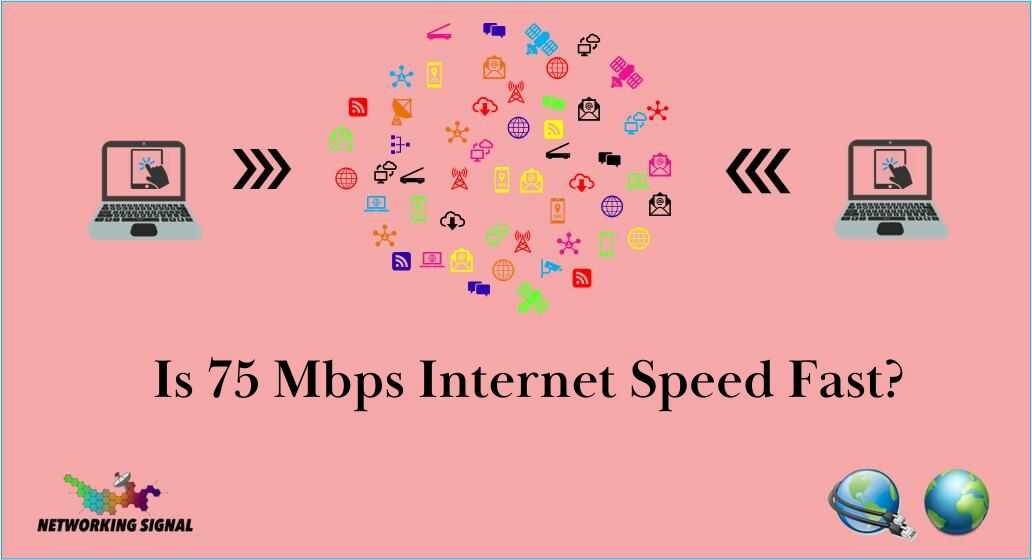In today’s digital world, internet speed has become more important than ever before. As we rely on the internet for work, entertainment, communication, and more, having a fast, reliable connection is now a necessity.
But is a speed of 75 Mbps actually considered fast? What factors should you evaluate to determine if upgrading to 75 Mbps makes sense for your household?
In this article, we will dive into what internet speed means, and examine how 75 Mbps performs for different uses, compare it to slower options, and discuss key considerations to help you decide if 75 Mbps is sufficiently fast for your needs.
By evaluating your current usage, internet habits, and future needs, you can determine whether upgrading to 75 Mbps will provide the fast, smooth online experience you desire in today’s bandwidth-hungry world.
Importance of internet speed in today’s digital age
As we become increasingly dependent on the internet for work, education, business, entertainment, and more, having sufficient internet speed is crucial for an optimal online experience.
Fast internet enables us to access information and content quickly, work and collaborate efficiently, utilize advanced technologies seamlessly, and get more done in less time.
For both personal and professional needs, good internet speed has become a necessity just like electricity and water in this digital age.
What is internet speed and its measurement in Mbps?
Internet speed refers to the rate at which data is transmitted over the Internet. It determines how fast pages, videos, and files can load or buffer on your devices.
Internet speed is measured in megabits per second (Mbps). The higher the Mbps, the faster the internet connection. 10 Mbps means 10 megabits of data is downloaded per second.
Download and upload speeds together comprise your total internet speed. ISPs usually specify speed in Mbps for their various plans to help consumers pick the right option as per their needs and budget.
Understanding Internet Speed
What affects internet speed?
Many technical factors affect the actual speed you experience. Bandwidth limitation depends on the subscribed internet plan – higher bandwidth supports faster speeds.
Network congestion during peak times can slow down speed as more users access the network simultaneously. Servers located farther from you increase latency over long distances and reduce speed.
Outdated components like modems and routers can bottleneck speed delivery. WiFi interference, expired DNS settings, computer viruses, and multiple devices using bandwidth simultaneously also impact speed.
Differentiating between download and upload speeds
Download speed is the rate at which data is transferred from the internet to your device. This allows you to view web pages, stream content, and download files.
Upload speed is how fast you can transfer data like photos or videos from your device to the internet.
Download speeds are usually faster as most online activities involve consuming content.
But upload speed is also important for activities like video calls or backing up data to cloud storage. ISPs optimize plans depending on typical download and upload needs.
The Significance of 75 Mbps Internet Speed
What can you do with 75 Mbps?
75 Mbps gives you the ability to stream HD movies, and games online, conduct video calls, and operate multiple devices without lag.
Entire families can stream, work, learn, and play simultaneously with 75 Mbps speed.
You can seamlessly surf the web, download large files quickly, upload high-res photos quickly, and connect smart devices without interruptions.
Essential activities like telehealth appointments, remote work, and online classes are enabled reliably.
Comparison with lower internet speeds
75 Mbps is over 10 times faster than the FCC’s minimum speed standard of 6 Mbps. Pages and videos load in seconds compared to minutes at lower speeds.
File downloads are significantly faster – you can download a full movie at 75 Mbps in 8 minutes vs. 1 hour at 6 Mbps. Video calls are higher quality and gaming is smooth without frustrating lags.
With lower speeds, families often take turns using bandwidth. At 75 Mbps, there is enough speed and bandwidth for everyone to be online together.
Look Here:
Factors to Consider for Optimal Internet Speed
Internet service provider (ISP) options
Choosing the right ISP and plan is important to get your desired speeds consistently. Research ISPs available in your area and compare their speed offerings.
Look at factors like value for money, reliability, customer service, and extra features. Consider bundled plans with TV or other services to potentially get more bang for your buck.
Be aware of taxes, fees, data limits, and contract terms before signing up. Opt for high-speed equipment and WiFi optimization services if offered.
Evaluating your Internet usage needs
Assess how many devices access your home network simultaneously, the types of activities done online, and typical bandwidth usage to pick an adequate speed plan.
Account for future needs as well – newer devices, smart home gadgets, and bandwidth-heavy applications will continue to emerge.
Consider upgrading if you frequently experience lag, buffering, or slow speeds even with one or two devices online. 75 Mbps gives you headroom to easily accommodate multiple devices and users.
Conclusion and Takeaway
Getting a 75 Mbps internet connection can provide fast, reliable performance for your digital life today and tomorrow. Evaluate your home usage, internet behavior, and future needs to determine if upgrading makes sense. At 75 Mbps, you can work productively, access entertainment smoothly, and connect with your world seamlessly.

